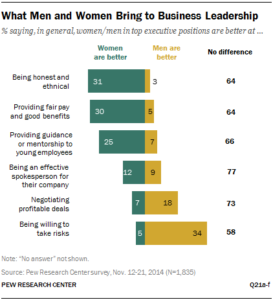Feminine gamification viewpoint: What will it take?
I often wonder what it will take to make women equal partners in work, life, leadership, etc. even if we come with generally speaking slightly different skill sets. Yesterday I read yet another news item about a lady having to leave social media, her house etc due to death threats based on being outspoken about gender inequality in her area. It seems that in traditionally male dominated fields this is deemed to be acceptable rhetoric?! I guess you would only have to look at the US presidential race to see this playing out at one of the worst levels ever, but let’s not stoop that low.
I always look for research when I have a hunch that something is not quite equal either to validate or reject my original feelings. Pew Research in the US did extensive research about the perceptions of men and women in c-suite leadership positions. Here are some of the key findings from the research:
“The vast majority of people (80%) say that men and women make equally good business leaders, but many feel businesses are not ready to hire women for top executive positions. Men and women agree that both genders are equally capable of leading in the business world.
Looking at some of the specific attributes required to be successful in business, again, the public sees relatively few differences between men and women. Strong majorities say there is no difference between men and women when it comes to being an effective spokesperson for their company (77% see no difference) and negotiating profitable deals (73%). And solid majorities see no difference between men and women on providing guidance or mentorship to young employees (66%), providing fair pay and good benefits (64%), being honest and ethical (64%) and being willing to take risks (58%).
Among those who do draw distinctions between men and women on these leadership attributes, some clear gender patterns emerge. About three-in-ten adults (31%) say women in top executive positions are more honest and ethical than men; only 3% say men are better in this regard. Similarly, 30% say women do a better job at providing fair pay and good benefits, while 5% say the same about men. Women are also perceived to have an advantage in providing guidance or mentorship to young employees: 25% say women are better at this, while 7% say men are better.
The largest gap in favor of men is on the willingness to take risks. Some 34% of the public says men in top executive positions are better at this than women; only 5% say women are better than men. Men are also seen as having an edge in negotiating profitable deals. About one-in-five adults (18%) say men in top business positions are better at this than women, while 7% say women are better at this.
Neither men nor women are seen as having a clear advantage in serving as spokespeople for their companies: 9% say men are better at this, 12% say women are better and 77% see no difference between the two.
Views about men and women and their effectiveness in certain aspects of business leadership differ somewhat by gender. Women are more likely than men to say that female leaders are more honest and ethical than their male counterparts (35% of women say this, vs. 27% of men). Similarly, more women than men say that female business leaders are better at providing fair pay and good benefits (34% vs. 24%) and providing guidance or mentorship to young employees (28% vs. 21%).
Men are more likely than women to say that male leaders in business are more willing to take risks (37% of men say this, compared with 31% of women). In addition, men are more likely than women to say there is no gender difference when it comes to being honest and ethical and providing fair pay and good benefits.”
Considering that the vast majority of people think that both gender are equally good in leadership with marginal differences in most areas, my question really is what will it take to redraft the balance in real appointments?
Always followed by the question can we design the structures in such a way that where there is perception of a better skill based on gender that that gender is pulled in for input at the very minimum. I would love to come up with a system that alerts you when the decision making was too skewed for one gender and any other discriminative factor for that matter really.
I also often wonder if I could make a game where the power was completely skewed in a matriarchal sense and women were the main leaders, what traits would they have and how would it affect men in the game.
For now I just wonder what it will take to make the balance more even?




